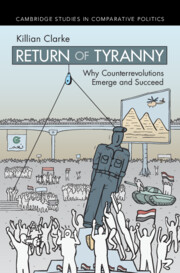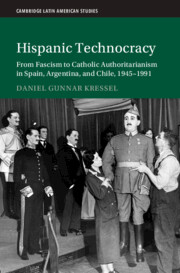Refine search
Actions for selected content:
442 results
8 - Conclusion
-
- Book:
- Return of Tyranny
- Published online:
- 17 September 2025
- Print publication:
- 23 October 2025, pp 234-248
-
- Chapter
- Export citation
1 - Introduction
-
- Book:
- Return of Tyranny
- Published online:
- 17 September 2025
- Print publication:
- 23 October 2025, pp 1-17
-
- Chapter
- Export citation

Politicizing Business
- How Firms Are Made to Serve the Party-State in China
-
- Published online:
- 29 September 2025
- Print publication:
- 25 September 2025
-
- Book
-
- You have access
- Export citation
1 - The Hidden Political Roles of Firms in China
-
- Book:
- Politicizing Business
- Published online:
- 29 September 2025
- Print publication:
- 25 September 2025, pp 1-36
-
- Chapter
-
- You have access
- HTML
- Export citation
3 - After Constitutionalism
-
-
- Book:
- Reckoning with Law in Excess
- Published online:
- 09 September 2025
- Print publication:
- 25 September 2025, pp 76-95
-
- Chapter
-
- You have access
- Open access
- HTML
- Export citation

Return of Tyranny
- Why Counterrevolutions Emerge and Succeed
-
- Published online:
- 17 September 2025
- Print publication:
- 23 October 2025
Film-Making the Nation Great Again: Audio-visualizing History in the Authoritarian Toolkit
-
- Journal:
- Perspectives on Politics , First View
- Published online by Cambridge University Press:
- 10 September 2025, pp. 1-33
-
- Article
-
- You have access
- Open access
- HTML
- Export citation
A Harm Reduction Approach to Attitudinal Racism
-
- Journal:
- Canadian Journal of Philosophy , FirstView
- Published online by Cambridge University Press:
- 09 September 2025, pp. 1-25
-
- Article
-
- You have access
- Open access
- HTML
- Export citation
The Value of Values for Autocrats: Traditional Morality and Putin’s 2020 Term-Limit Contravention
-
- Journal:
- Perspectives on Politics , First View
- Published online by Cambridge University Press:
- 25 August 2025, pp. 1-16
-
- Article
-
- You have access
- Open access
- HTML
- Export citation
A Little Lift in the Iron Curtain: Emigration Restrictions and Criminal Activity in Socialist East Germany
-
- Journal:
- Perspectives on Politics , First View
- Published online by Cambridge University Press:
- 25 August 2025, pp. 1-20
-
- Article
-
- You have access
- Open access
- HTML
- Export citation
Path dependence and political bargaining in the elaboration of contents of authoritarian constitutions: the Portuguese Constitution of 1933
-
- Journal:
- European Law Open ,
- Published online by Cambridge University Press:
- 22 August 2025, pp. 1-15
-
- Article
-
- You have access
- Open access
- HTML
- Export citation
2 - Courts and the Executive Branch
-
- Book:
- Courts and the Body Politic
- Published online:
- 25 July 2025
- Print publication:
- 14 August 2025, pp 37-72
-
- Chapter
- Export citation

The Autocratic Voter
- Partisanship and Political Socialization under Dictatorship
-
- Published online:
- 13 August 2025
- Print publication:
- 07 August 2025

Hispanic Technocracy
- From Fascism to Catholic Authoritarianism in Spain, Argentina, and Chile, 1945–1991
-
- Published online:
- 07 August 2025
- Print publication:
- 14 August 2025
10 - The Power and Importance of Partisan Identities
-
- Book:
- The Autocratic Voter
- Published online:
- 13 August 2025
- Print publication:
- 07 August 2025, pp 216-226
-
- Chapter
- Export citation
2 - Social Networks, Political Geography, and Partisan Socialization
-
- Book:
- The Autocratic Voter
- Published online:
- 13 August 2025
- Print publication:
- 07 August 2025, pp 25-56
-
- Chapter
- Export citation
3 - The Case of Cameroon
-
- Book:
- The Autocratic Voter
- Published online:
- 13 August 2025
- Print publication:
- 07 August 2025, pp 57-78
-
- Chapter
- Export citation
1 - Partisanship in Electoral Autocracies
-
- Book:
- The Autocratic Voter
- Published online:
- 13 August 2025
- Print publication:
- 07 August 2025, pp 1-24
-
- Chapter
-
- You have access
- HTML
- Export citation
The Use of ‘So-called’ as a Propaganda Device in China
-
- Journal:
- Journal of East Asian Studies , First View
- Published online by Cambridge University Press:
- 07 August 2025, pp. 1-15
-
- Article
-
- You have access
- Open access
- HTML
- Export citation
1 - Political Legitimacy as an Intellectual Journey
- from Part I - Setting the Stage
-
- Book:
- The Law and Politics of International Legitimacy
- Published online:
- 14 July 2025
- Print publication:
- 24 July 2025, pp 11-23
-
- Chapter
- Export citation
